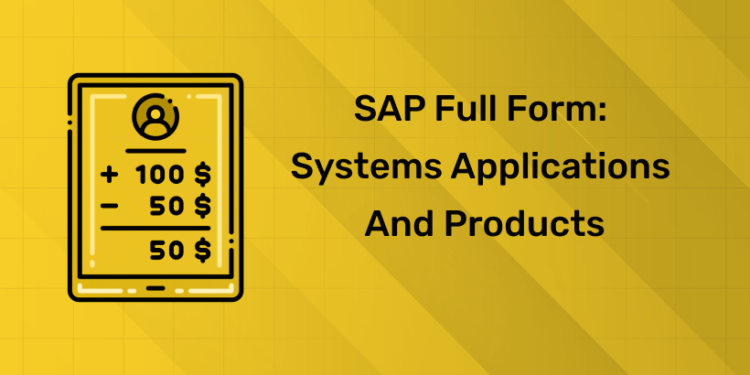Table of Contents
In the fast paced world of business technology, software systems are the backbone of processes, productivity and growth. Among the top solutions for enterprise resource planning (ERP) SAP is the market leader. When we hear the term “SAP” we wonder what does SAP stand for. Simply put SAP stands for “Systems Applications and Products”. SAP has changed the way businesses operate, it’s a pillar in the tech driven business world. In this post we will go deep into the SAP full form, its history, importance and how it impacts businesses globally.
What Does SAP Stand For?
SAP full form is Systems Applications and Products. SAP is a German multinational software company that creates enterprise software to manage business and customer relationships. The company was founded in 1972 by 5 former IBM employees. The term “SAP” not only refers to the company itself but also to its ERP software solutions that centralizes data management across businesses. SAP has tools to manage financials, logistics, human resources and other key areas.
Join to learn SAP FICO from the Experts! Click for the demo class!
SAP History
1: Accounting provides information on
To understand the importance of SAP let’s take a look at its journey since its inception.
- 1972: SAP was founded by 5 engineers—Dietmar Hopp, Hasso Plattner, Claus Wellenreuther, Hans-Werner Hector, and Klaus Tschira—in Mannheim, Germany.
- First major product: 1973: SAP launched its first product SAP R/1 which allowed businesses to centralize their data systems.
- Global expansion: By mid 90’s SAP went global, launched SAP R/3 a client-server version of their software. This was a big leap, made their ERP solutions accessible to businesses of all sizes.
- SAP today: Today SAP is used by thousands of companies across 180+ countries. From small businesses to big enterprises, SAP has solutions for all types of industries.
What Does SAP Do?
SAP provides Enterprise Resource Planning (ERP) software but its impact goes beyond that. Its applications helps businesses to automate, streamline and provide real-time analytics. Here are a few key areas of SAP:
- Financial Management: SAP’s financial management tools helps organizations to manage accounting, compliance and risk management. It provides a financial view to help with decision making.
- Supply Chain Management: From procurement to logistics and warehousing SAP has tools to monitor and optimize supply chains.
- Human Capital Management (HCM): SAP’s HCM modules covers recruitment to payroll and employee performance tracking.
- Customer Relationship Management (CRM): SAP helps companies to manage their customer interactions to build better relationships and improve sales.
- Business Intelligence: SAP’s analytics tools helps businesses to forecast, analyze and make better decisions.
Why SAP?
SAP is the backbone of many companies for the following reasons:
- Data Centralization: SAP centralizes data across all business functions. No more duplicates and everyone in the company has real-time data.
- Scalability: Whether you’re a small business or a multinational, SAP has scalable solutions that grow with your business.
- Customization: SAP solutions are highly customizable so you can adapt the software to your needs.
- Compliance and Reporting: SAP’s financial and compliance tools keep you compliant with industry regulations and provide detailed reporting.
- Global Standards: With presence in over 180 countries, SAP follows global standards, perfect for multinational companies.
- Cloud and On-Premise: SAP has both cloud and on-premise ERP solutions so you have the flexibility to manage and store your data how you want.
SAP Limitations
While SAP has many benefits, it’s not without its drawbacks:
- Complexity: SAP systems are complex and require extensive training for employees to use.
- Cost: Setup and maintenance of SAP systems can be expensive especially for small businesses.
- Implementation Time: Implementing SAP can take months or even years depending on the complexity of the business.
- Customization Challenges: Although SAP is customizable, the process can be time-consuming and expensive for very specific business needs.
- Continuous Updates: Frequent updates and patches can disrupt business processes if not managed properly.
How SAP Changes Business
Despite the limitations, SAP has changed the way businesses operate. Here’s how:
- Simplified Operations: By consolidating all business functions—financials, HR, supply chain and more—into one system, SAP eliminates siloed operations and smoothens out workflows.
- Data-Driven Decision Making: With real-time data analytics, businesses can make informed decisions that lead to better financial and operational outcomes.
- Automation: SAP automates many manual tasks, reduces human intervention and increases overall efficiency.
- Better Customer Experience: SAP’s CRM tools help businesses understand their customers better so they can provide personalized service and build loyalty.
- Compliance and Risk Management: SAP helps companies comply with local and global regulations so they minimize the risk of fines or legal issues.
Get Started with SAP
Ready to start your SAP journey? Here’s how:
- Assess Your Business: Before you implement SAP, you need to assess your business. What are your challenges? Which areas of your business will benefit most from SAP’s solutions?
- Choose the Right SAP Product: SAP has many products like SAP ERP, SAP S/4HANA, SAP SuccessFactors and more. Make sure to choose the one that aligns with your business goals.
- Work with an SAP Partner: Implementing SAP can be complex. Working with a certified SAP partner will make the process smoother.
- Invest in Training: Ensure your team is trained well to use SAP to maximize the system.
-
Monitor and Improve: Once implemented, monitor the system and look for ways to improve.
Join to learn SAP FICO from the Experts! Click for the demo class!
Conclusion
In a nutshell, SAP (Systems Applications and Products) has changed the way we manage our businesses. Whether you’re a small business or a global company, SAP has tools to make you more efficient, streamline your processes and give you valuable insights to drive your business. But implementing SAP comes with its own set of challenges like high costs and complexity. But with proper planning and the right team, the benefits far outweigh the limitations.
Want to upskill and learn how SAP works? Enroll in a course. Entri’s SAP FICO Course gives you in-depth knowledge on financial accounting and controlling in SAP systems. With industry experts, flexible schedules and practical assignments, this course will help you master SAP and boost your career. Check out Entri’s SAP FICO Course.
| Related Articles |
| Accounting courses we offer |
Accounting courses in Different Cities |
| Business Accounting & Finance Certification | |
| Tally Course | |
| Taxation Course | |
| UAE Accounting Course | |
| GST Course |
Frequently Asked Questions
Why is SAP important for businesses?
SAP centralizes business operations, enabling real-time data processing and improving decision-making.
What does SAP stand for, and what is its significance in business?
SAP stands for Systems Applications and Products in Data Processing. It is one of the world’s leading providers of enterprise software that helps businesses manage their operations efficiently. The significance of SAP lies in its ability to centralize data and processes, making real-time business intelligence accessible across various departments like finance, human resources, supply chain, and customer relationship management.
How does SAP help companies streamline their operations?
SAP helps companies by providing a single unified platform where various departments such as finance, sales, HR, and supply chain can manage their tasks seamlessly. SAP automates many routine tasks, eliminates data silos, and ensures that all business functions are integrated. For instance, when sales data is entered, the finance team can instantly see it and adjust cash flow forecasts.
Why is SAP considered essential for large enterprises?
SAP is essential for large enterprises because it provides a scalable and customizable solution that meets the complex needs of multinational corporations. SAP allows companies to manage multiple business functions on one platform, which simplifies data sharing, compliance management, and process automation.
How can businesses ensure a smooth SAP implementation process?
To ensure a smooth SAP implementation, businesses should start by thoroughly assessing their needs and defining clear goals for what they want to achieve with the system. Choosing the right SAP modules that align with these objectives is crucial. Partnering with experienced SAP consultants or certified implementation partners can also make the process more manageable.
What industries benefit the most from using SAP software?
SAP’s flexible and customizable solutions are used across a wide variety of industries, including manufacturing, finance, retail, healthcare, logistics, and energy. For example, in the manufacturing sector, SAP helps manage inventory and production scheduling. In finance, it streamlines accounting and compliance.
Is SAP difficult to learn?
SAP can be complex, but with the right training, like the SAP FICO course from Entri, it becomes manageable.











